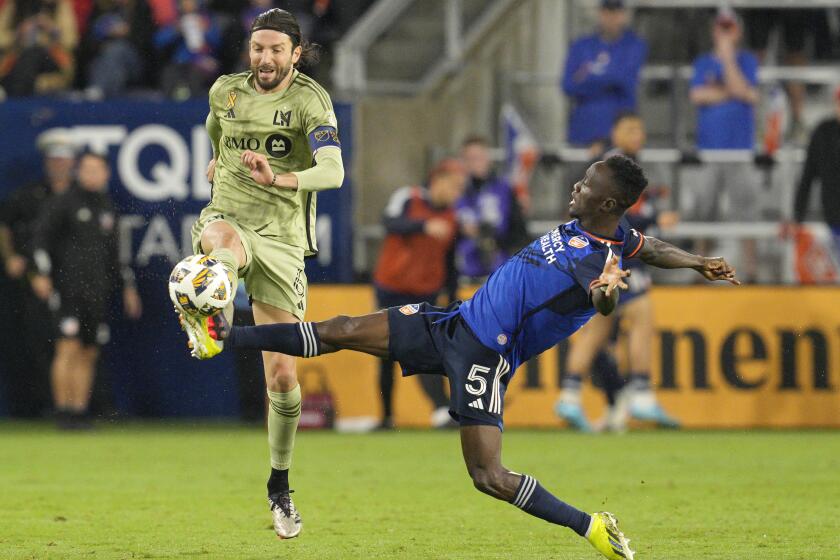World Cup Ticket Billing Backlog Concerns Many : Soccer: Sellers not getting commissions, buyers not getting tickets, organizers not getting $40 million or more in revenue.
Delays in processing World Cup ticket requests for the expensive Premier program have caused a billing backlog of at least $40 million, according to sources.
The slowness in processing orders and the apparent confusion about the ticket inventory raise questions about the number of tickets, if any, that might be available for individual games. All World Cup tickets for the early rounds have been sold in strips or as part of a package. The chance for the public to buy a single-game ticket is remote.
For those involved in the Premier ticket program, a high-end offering of the best seats, a waiting game is leaving soccer fans with frayed nerves and World Cup coffers without millions in income.
Scott LeTellier, managing director and chief operating officer of the World Cup Organizing Committee (WCOC), did not have exact figures of orders that have gone unbilled but said he would be surprised if the backlog was as high as $40 million. Still, some World Cup sources place the figure at closer to $70 million.
“The Premier program has gone especially well, and it has provided significant revenues for our committee,” LeTellier said. “If I’m looking for a problem on the operational side, this would not be a big area of concern.”
The Premier ticket program is an exclusive offering of tickets in platinum, gold and silver packages. Because the tickets are sold along with a package of amenities, the price of the ticket is hidden. The average price for a World Cup ticket is $58, with the most expensive--a Category 1 ticket for the final--having a face value of $475.
Because the demand for tickets has far outstripped the supply, the Premier program is considered a good value for those desperate for World Cup tickets. The cheapest ticket for the July 17 final at the Rose Bowl--a Category 3 ticket with a face value of $180--is fetching $2,000 at Southern California ticket brokers.
As it becomes evident to fans that World Cup tickets will continue to be scarce, that 1,100% markup might become a bargain.
The platinum package costs $10,000 for a ticket to 10 games, “VVIP seats,” preferred parking and, among other amenities, access to U.S. team practices. Premier tickets are marketed to companies and well-to-do individuals. Despite the cost, the Premier program has sold well. Premier packages have sold out at Washington, East Rutherford, N.J.; Chicago and Orlando, Fla.
Every offering of World Cup tickets to date has sold out. The first sale of first round and round-of-16 tickets was to the “soccer family” last March. When that became grossly oversubscribed, World Cup officials added 200,000 tickets that had been set aside for the public sale. The public sale was conducted by telephone and sold out quickly, in some venues in a matter of hours.
Ticket demand has never diminished. After the final draw in Las Vegas last month, requests for tickets increased fivefold, according to World Cup officials. As these programs sell out, it decreases the likelihood that any individual game tickets will be available to the public on the day of the game. World Cup officials have always warned that this might happen.
All that makes the delays in processing the Premier ticket requests puzzling, because demand for tickets is well known. Additionally, it is unknown why the WCOC would not move as quickly as possible to claim millions of dollars in income and promptly bill those who have filled out ticket request forms.
LeTellier conceded that most WCOC staff spent December working on the final draw and that personnel was stretched thin. He said four World Cup employees work on the Premier ticket processing: two to process the orders and two to handle the billing.
According to interviews with Premier ticket sales people and those who requested tickets, some customers have been waiting months to receive bills and, in at least one case, a client was billed, paid the bill and received his canceled check, but still received a letter from the WCOC that demanded payment within 48 hours.
Delays mean salespeople aren’t getting commission checks.
In separate interviews, LeTellier and Mike Riley, president of Cup Tickets, a Los Angeles-based World Cup ticket agent authorized to sell Premier tickets, said they did not consider there to be any problems processing orders for the Premier ticket program.
Yet in a Dec. 28 memo to his sales staff, after weeks of their complaints about late commission checks, Riley apologizes and blames “procedural delays at the World Cup.”
The memo reads, in part: “This report reflects less than 10% of the orders we had submitted by the time the report was produced. Obviously, WCOC’s backlog in filing, billing and pursuing receivables is causing severe delays to develop.”
A portion of an earlier memo from Riley to his staff: “The good news is that we got our first check. The bad news: It apparently takes even longer than I feared for the WCOC to process our orders.” Before Nov. 8, according to the memo, Cup Tickets had been paid $370 in commissions after more than three months work.
One client who has experienced a delay is Bruce Laker of American Challenge Enterprises, a soccer supply distributor in Farmingdale, N.Y. Laker applied through Cup Tickets for five silver-ticket packages for the Meadowlands on Oct. 21 and has yet to receive an invoice.
“I got my order in within two days of being sold,” Laker said. “I haven’t heard from anyone, and the Cup Tickets people seem to be getting stonewalled. I don’t know what it is. I don’t know if it’s because the World Cup people are totally inefficient.”
LeTellier said that because the Premier ticket program is for premium seats--mostly in Category 1--the processing was slower because the WCOC was mindful of ambush marketing: corporations that had not gotten in the World Cup sponsor program attempting to buy blocks of tickets and undermine official sponsors.
LeTellier said a four-member executive committee reviewed Premier requests weekly, and if there has been a delay it would have come because some requests have been set aside for closer scrutiny for conflicts. He said about 4%-5% of the Premier orders have been rejected because of conflicts with sponsors.
“If there have been delays, I’m unaware of them,” LeTellier said.
That statement notwithstanding, LeTellier recently streamlined the review process so that he alone will review ticket orders.
Some Premier ticket salespeople have been surprised by what they say is a laissez faire attitude from World Cup regarding monitoring and controlling the volume of tickets sold.
More than a dozen groups have been selling tickets for all nine venues for more than six months, but each group has little information about what others have sold or what seats were available at each venue. LeTellier said everyone knew the quota, but no salesperson interviewed could say how many tickets were available in the program.
“They just said, ‘sell tickets,’ they didn’t say how many. We sold as much as we could and asked questions later,” one Premier ticket salesperson said.
LeTellier would not say how many of the World Cup’s 3.6 million tickets had been earmarked for the Premier ticket program, but a Cup Tickets memo indicated that a sellout of Premier tickets would yield $180 million to the WCOC.
LeTellier said sales in the Premier program would continue through March, and that all salespeople were continuing to sell tickets, even though the program is near the saturation point.
“The sales department has been told to bring in any orders they can bring in,” LeTellier said.
The system is for salespeople to generate as many orders as possible, even if they become oversubscribed. The two World Cup employees then forward the requests to the approval committee. When approved, the order is sent to two other workers for invoicing.
Salespeople are instructed to inform customers that an order for tickets is simply a request and doesn’t become an official order until it has gone through the approval process. LeTellier said because of this disclosure, there should be no disgruntled customers.
“The way I expected it to work was I’d go into a client and I’d be able to show him a computer generated map of each stadium, showing the seating area and those seats that had been sold would be X’d out,” Paul Hinkley of Cup Tickets said. “You’d think the whole thing would be on a computer, so that I don’t sell tickets for a venue that don’t exist.”
Salespeople are not able to sell tickets for specific seats, only for a general category of premium tickets. As with all World Cup ticket programs, Premier tickets will not be sent to customers until May to try to stave off counterfeiting.
Said one Cup Tickets employee: “From the way it sounds, their system seems a little primitive. You can go out and sell, but if you don’t know what you’re inventory is, you’re going to be in trouble.”
Last week the processing of Premier ticket orders became a priority at the WCOC. The attention also might resolve the problem with salespeople getting paid.
One problem delaying some commission payments to Cup Tickets: two Cup Tickets salespeople had personal relationships with World Cup officials directly responsible for the Premier ticket program.
The apparent conflict of interest involving the wife of one World Cup ticketing employee and the girlfriend of another was investigated by the WCOC’s legal department. According to LeTellier, the investigation determined that the Cup Tickets employees had not received any special considerations as a result of their personal relationships.






